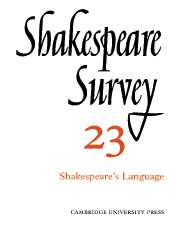Book contents
- Frontmatter
- Shakespeare and the Tune of the Time
- Some Functions of Shakespearian Word-formation
- Guide-lines for Interpreting the Uses of the Suffix ‘-ed’ in Shakespeare’s English
- Shakespeare’s Use of Colloquial Language
- Words, Action, and Artistic Economy
- ‘Antony and Cleopatra’: the Limits of Mythology
- Shakespeare’s ‘War with Time’: the Sonnets and ‘Richard II’
- Shakespeare and Christian Doctrine: Some Qualifications
- Shakespeare’s Poets
- The Text of Coleridge’s 1811–12 Shakespeare Lectures
- Shakespeare Studies in German: 1959–68
- A Neglected Jones/Webb Theatre Project: ‘Barber-Surgeons’ Hall Writ Large
- Interpretation or Experience? Shakespeare at Stratford
- 1 Critical Studies
- 2 Shakespeare’s Life, Times, and Stage
- 3 Textual Studies
- Index
- Plate section
Guide-lines for Interpreting the Uses of the Suffix ‘-ed’ in Shakespeare’s English
Published online by Cambridge University Press: 28 March 2007
- Frontmatter
- Shakespeare and the Tune of the Time
- Some Functions of Shakespearian Word-formation
- Guide-lines for Interpreting the Uses of the Suffix ‘-ed’ in Shakespeare’s English
- Shakespeare’s Use of Colloquial Language
- Words, Action, and Artistic Economy
- ‘Antony and Cleopatra’: the Limits of Mythology
- Shakespeare’s ‘War with Time’: the Sonnets and ‘Richard II’
- Shakespeare and Christian Doctrine: Some Qualifications
- Shakespeare’s Poets
- The Text of Coleridge’s 1811–12 Shakespeare Lectures
- Shakespeare Studies in German: 1959–68
- A Neglected Jones/Webb Theatre Project: ‘Barber-Surgeons’ Hall Writ Large
- Interpretation or Experience? Shakespeare at Stratford
- 1 Critical Studies
- 2 Shakespeare’s Life, Times, and Stage
- 3 Textual Studies
- Index
- Plate section
Summary
Some years ago an eminent and richly experienced editor of Shakespeare revealed in conversation that he had decided to emend the word becomed in the following passage in Romeo and Juliet (iv, ii, 25-7):
Juliet. I met the youthful lord at Lawrence' cell,
And gave him what becomed love I might,
Not stepping o'er the bounds of modesty.
“When it was explained to him why he must on no account make away with this form, he at once gave up the idea; and all was well. If this was a startling hint that what was at issue might not be fully clear even to one of the elect, it must be added that in the O.E.D. itself (whose editors were in a much stronger position to deal with something that is essentially a philological question, and a simple one for such as them) some of the copious related material in Shakespeare's vocabulary has been inadequately or erroneously classified and thus left unclear, or has occasionally been misunderstood and misinterpreted. It may therefore be useful to state here explicitly, in a compressed but systematic form, the relevant facts of English word-formation and to show by economical illustration how they apply to Shakespeare's usage.
When, through phonetic or other changes, two originally distinct linguistic elements coalesce under one and the same form, some at least of the original differences in their use and their meaning of course commonly persist. But native speakers of the language (including the 'well' or highly educated) are normally unaware that two distinct entities are involved, let alone that the two forms are not identical in all aspects.
- Type
- Chapter
- Information
- Shakespeare Survey , pp. 27 - 38Publisher: Cambridge University PressPrint publication year: 1970
- 1
- Cited by

